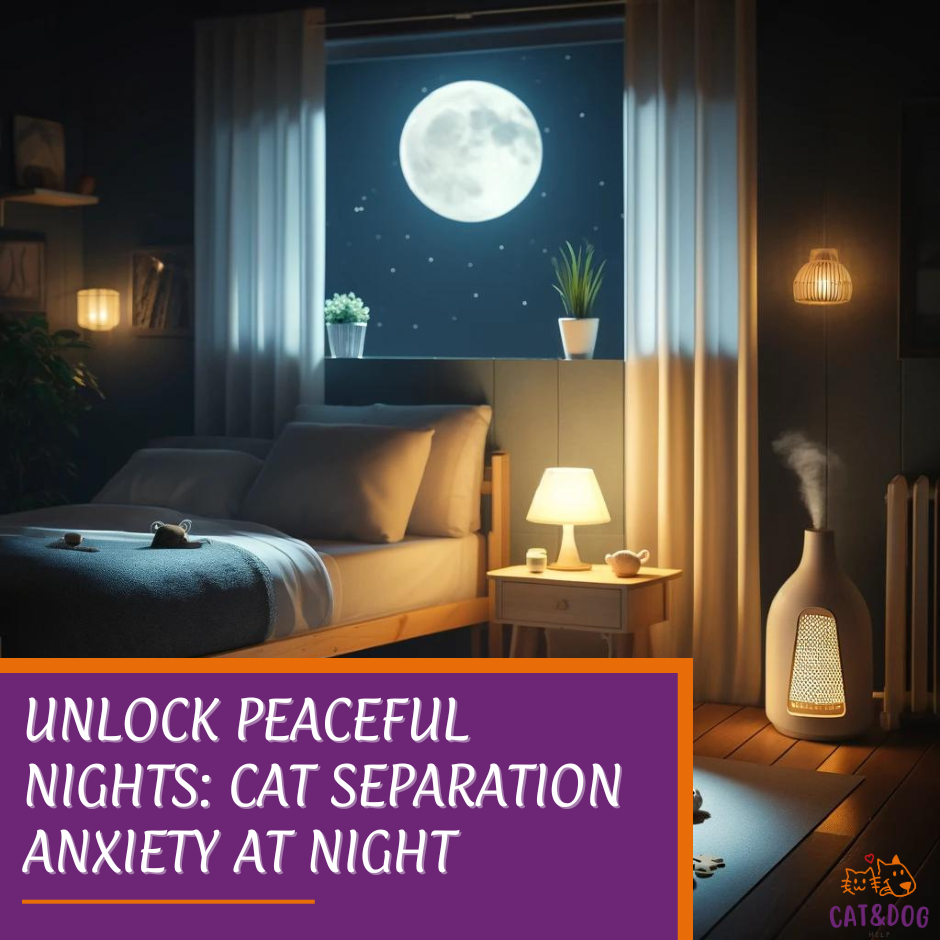Cat owners often observe their feline friends comfortably napping throughout the day, which leaves many to wonder why these same serene creatures sometimes exhibit signs of distress when the household settles for the night.
Understanding cat separation anxiety at night, is crucial for pet parents who find their cats becoming restless or vocal after dark. (1)
It’s not just about the inconvenience of disrupted sleep; it’s about recognizing the genuine stress your cat might be experiencing when they’re apart from you during the nighttime hours.
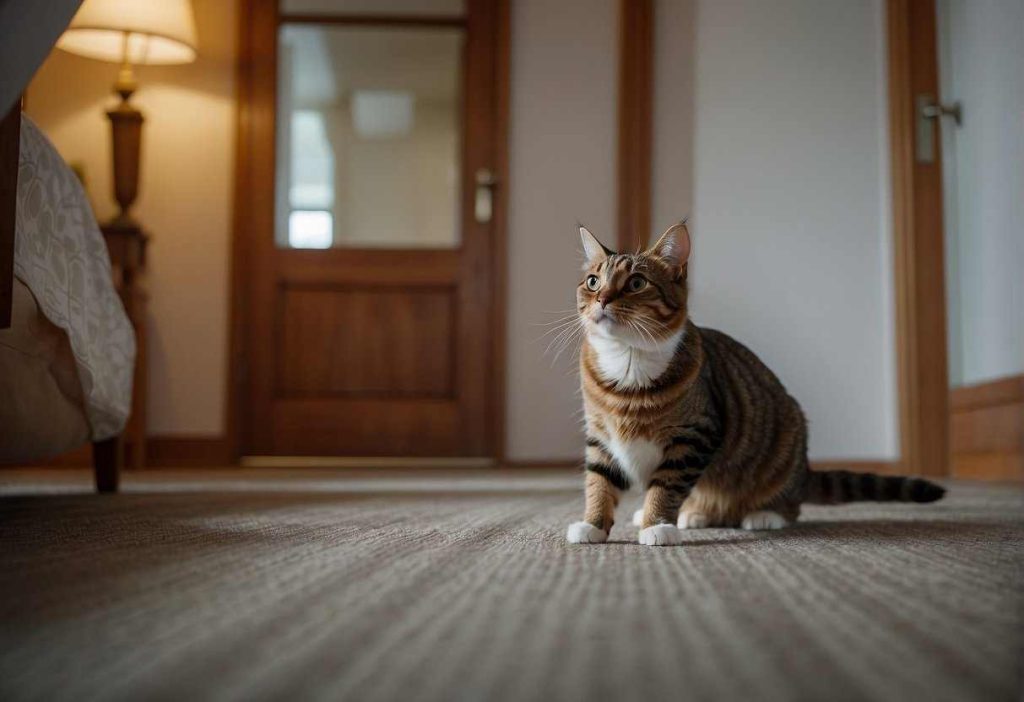
Managing and soothing your cat’s night-time separation anxiety is a gentle process that requires patience and empathy.
Recognizing the signs is the first step. You might observe your cat’s excessive vocalization, pacing, or even destructive behavior when you’re getting ready for bed.
By implementing strategies to address these behaviors, you can promote a more tranquil environment conducive to restful nights for both you and your feline companion. (2)
Providing emotional support and creating a routine that helps your cat feel secure can transform bedtime from a time of strife to a peaceful period for your pet.
Key Takeaways
- Recognizing and empathizing with your cat’s nighttime distress is essential.
- Applying consistent strategies can alleviate your cat’s separation anxiety.
- Establishing a comforting nightly routine offers emotional support for your cat.
Cat Separation Anxiety at Night: Here is The Explanation
You’re asleep, the house is quiet, and it’s possible your furry companion feels more vulnerable. Remember, their heightened senses make the darkness of night less comforting and more isolating.
Consider the possibility that your cat may have needs specific to the night-time—like a routine cuddle session or a midnight snack hunt. Here’s a quick rundown:
- Unique night-time triggers: Less human activity, dimmed lights, and the household’s transition to sleep can all contribute to a cat feeling alone.
- Understanding your cat: Does Fluffy have a cozy spot to sleep? Is she fed right before your bedtime? These small changes could mean more peaceful nights for both of you.
Symptoms to Watch For at Night
“Meow, meow, meow… is that the new midnight serenade?” Keep an ear out for these tell-tale signs:
- Excessive meowing or vocalization: It’s their way of saying, “Hey, don’t forget about me!”
- Restlessness and pacing: If your kitty’s doing laps around the bed, they might be feeling anxious.
- Destructive behaviors specific to night-time: Scratched sofas at 2 AM? Your cat may be telling you that they’re stressed.
By tuning into these behaviors and needs, you can take steps to soothe your cat’s nighttime jitters.
A well-placed cat bed, a night light, or some evening playtime can work wonders.
Remember, it’s all about creating a safe, comforting environment, so your whiskered companion knows you’re there, even in dreamland.
Managing and Alleviating Night-Time Separation Anxiety
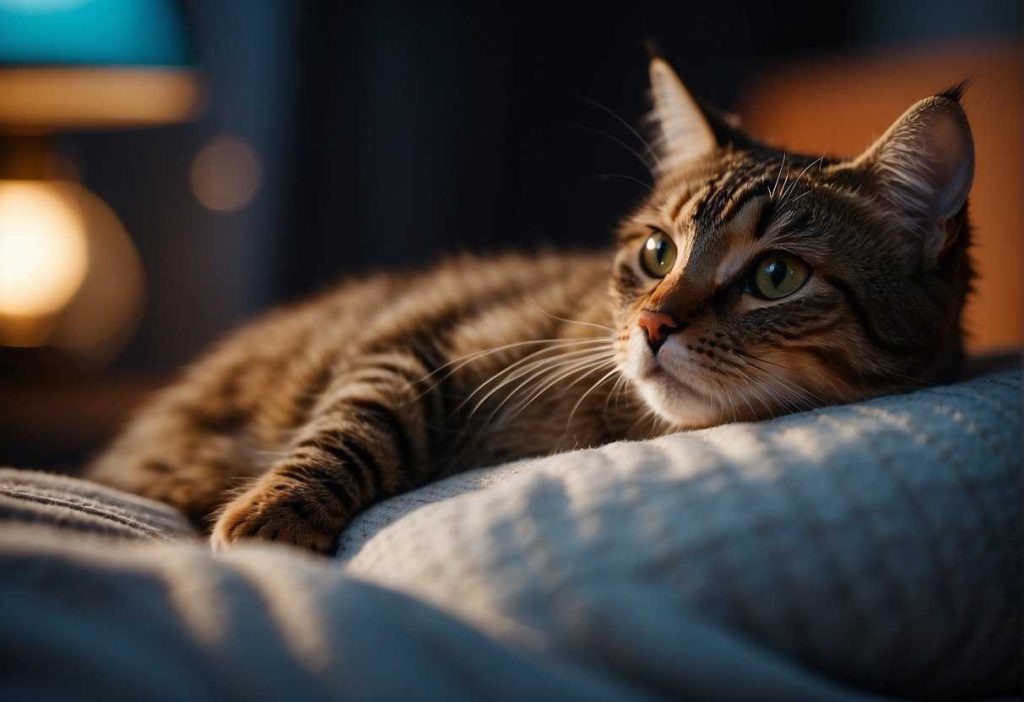
Creating a Comforting Night Environment
Ever had trouble snoozing because you’re missing your favorite blanket? Cats can feel the same! Let’s set up a cozy nook for your fluffy friend. (3)
- Comfort Objects: A soft blanket or a sweater with your scent might just work wonders.
- Soothing Sounds: A white noise machine or a soft-playing radio can provide a calming background hum.
- Night Lights: Cats don’t need much light, but a dim night light can help those jump in the dark.
- Secure Spaces: A pet bed with raised edges gives a sense of security, like a warm hug.
Gadgets to the rescue! Have you heard of pet cams? You can whisper a goodnight through these technological angels or even dispense a midnight treat remotely.
Detailed Evening Routines to Reduce Anxiety
Routines are the secret sauce to a peaceful night. Here’s how to whip up a soothing evening for your cat:
- Wind-Down Time: Start with some gentle petting or brushing their fur to set the ‘time to relax’ mood.
- Play Sessions: Engage in some playful antics with a laser pointer or a string toy. Aim for 15-20 minutes to get that energy out!
- Dinner Time: A full belly promotes sleepiness, but keep it at least two hours before bed to prevent any midnight zoomies.
- Quiet Time: As your bedtime nears, tone down the activity. Maybe read a book in bed, signaling that it’s almost lights out.
Remember, it’s all about patience and consistency. You’ve got this! And so does your little night prowler. With a routine in place and a comforting environment, you’ll both be sailing smoothly through dreamland.
Advanced Strategies and Professional Insights for Night-Time Anxiety
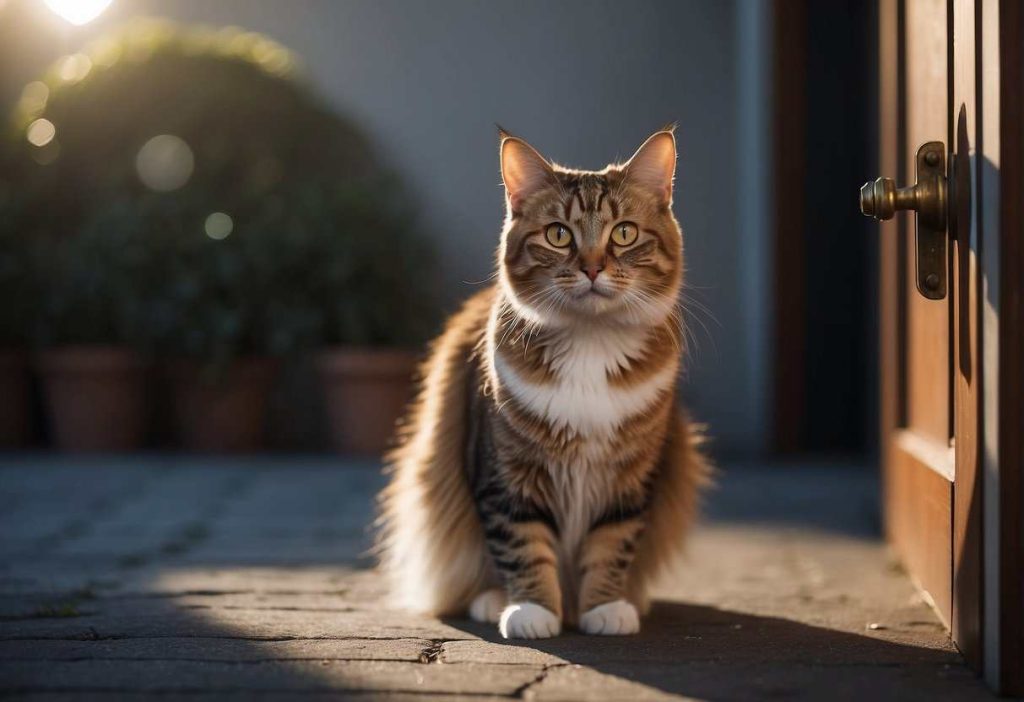
Consulting with Professionals
Professional help can shed light on the root issues causing your cat’s distress and guide you toward a more peaceful night.
- Medical Interventions: Is your cat pacing like a lion at night? It might be more than just anxiety. Persistent night-time behavioral changes warrant a vet visit to rule out underlying health issues.
- Behavior Specialists: An animal behaviorist is your go-to for bespoke solutions. They bring specialized strategies to the table, targeting your cat’s unique needs. (4)
Expert Opinions and Case Studies
Sometimes a story says it all. Experts in feline behavior often share case studies that illuminate the path to tranquility.
- Insights on Anxiety: Behaviorists find that predictable routines and environmental enrichment often spell relief for anxious cats.
- Success Stories: Consider the tale of Whiskers, an elusive night prowler. After implementing a strict play-before-bed regimen, his nocturnal quests turned into dreamland adventures.
Remember, with the right combination of professional advice and personalized care, your nightlife can return to normal — and that includes uninterrupted sleep!
Emotional Support and Community Engagement

Sharing Experiences and Building Community
Here’s the scoop on community support:
- Online Forums: Websites like TheCatSite.com and Reddit’s r/cats are bustling with fellow cat lovers who might just have the advice you need.
- Local Pet Groups: Connect with neighborhood pals through platforms like Meetup. Sharing stories can turn “meow-night madness” into shared chuckles.
Understanding Your Cat’s Emotional Needs at Night
Curled up or stretched out, your cat seeks love 24/7. Let’s tighten that kitty bond when the stars are out:
- Attachment: Cats, like their humans, need reassurance. A snuggle and a soothing word can help ease their worry.
- Companionship: Try these night-time bonding tips:
- Keeping a cozy bed near yours.
- A bedtime ritual, like a calm play session.
- Gentle music can soften the night for nervous kitties. (5)
Remember, your fluffy friend’s emotions are real, so your response should be as well!
Understanding Cat Separation Anxiety
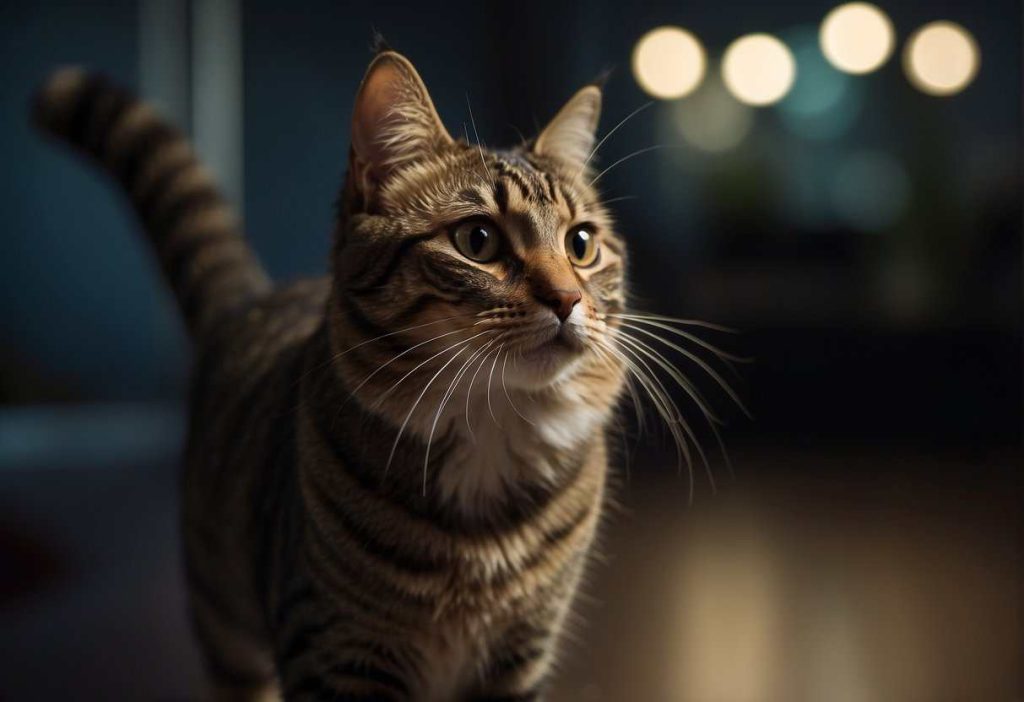
What Is Cat Separation Anxiety?
Have you ever seen your cat pacing around at night, seemingly desperate for your company? That could be a sign of separation anxiety.
Cat separation anxiety is when your feline friend exhibits distress and behavioral problems when separated from you, their favorite human.
As nighttime is generally calmer and quieter, the absence of a family member can feel more pronounced to your cat, sometimes triggering anxiety.
Causes and Triggers
During the day, there are distractions. But at night, those distractions disappear, making your cat more aware of your absence. Some factors contributing to nocturnal separation anxiety may include:
- Changes in routine: Cats are creatures of habit and any disruption can be stressful.
- Previous loss: If your cat has experienced loss in the past, they might fear being alone at night.
- Sensory stimulation: Lack of the usual daytime bustle can spike anxiety.
Imagine spending every day with someone only to have them vanish each night—no wonder some cats get anxious!
How It Affects Your Cat
When cats feel anxious, they may:
- Become clingy or needy.
- Refuse to eat or overeat.
- Experience health issues, like grooming excessively or developing stomach problems.
Recognizing the Signs of Separation Anxiety
Your cat’s nighttime shenanigans might be a cry for help. Look out for:
- Excessive meowing or howling at night.
- Clawing at your bedroom door.
- Unusual sleeping patterns.
Seeing your cat upset is tough—luckily, understanding is the first step towards helping them feel better. By recognizing these behaviors, you can work towards soothing your cat’s nighttime worries!
Enhancing Night-Specific Understanding and Practical Advice
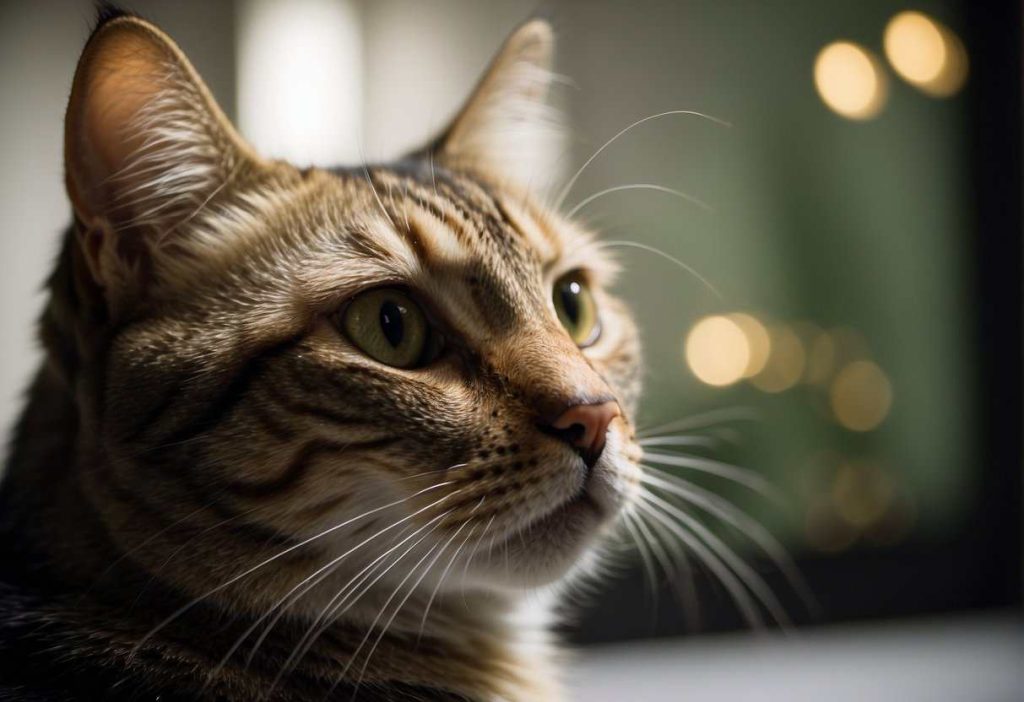
Detailed Evening Routines to Reduce Anxiety
A consistent bedtime routine can work wonders. Here’s how you can craft one:
- 8 PM – Playtime: Engage in a solid 15 minutes of play with toys like feather wands or laser pointers.
- 8:30 PM – Dinner: Serve dinner to help your cat feel full and sleepy.
- 9 PM – Cuddle Time: Spend some quiet time petting or grooming your cat; it’s like a kitty meditation!
- 9:30 PM – Settle Down: Offer a warm bed or a favorite blanket in a quiet, dark place.
Remember, consistency is key!
Creating a Comforting Night Environment
Now, let’s talk environment.
Your cat’s night-time comfort zone is kind of a big deal. Here’s what can help:
- Comfort Objects: Blankets, a piece of your clothing, or a plush toy can be reassuring.
- Safe Spaces: Think cat condos or a perch with a view.
And for a tech twist:
- Sound: A soft music playlist or a white noise machine can be the backstage crew for a peaceful night.
- Visual: Night lights or a simulated “window” screen to mimic outdoor tranquility can be the ticket to Zzzville for your cat.
With these tips, your kitty’s night-time woes can turn into purr-fect dreams!
Quick Recap
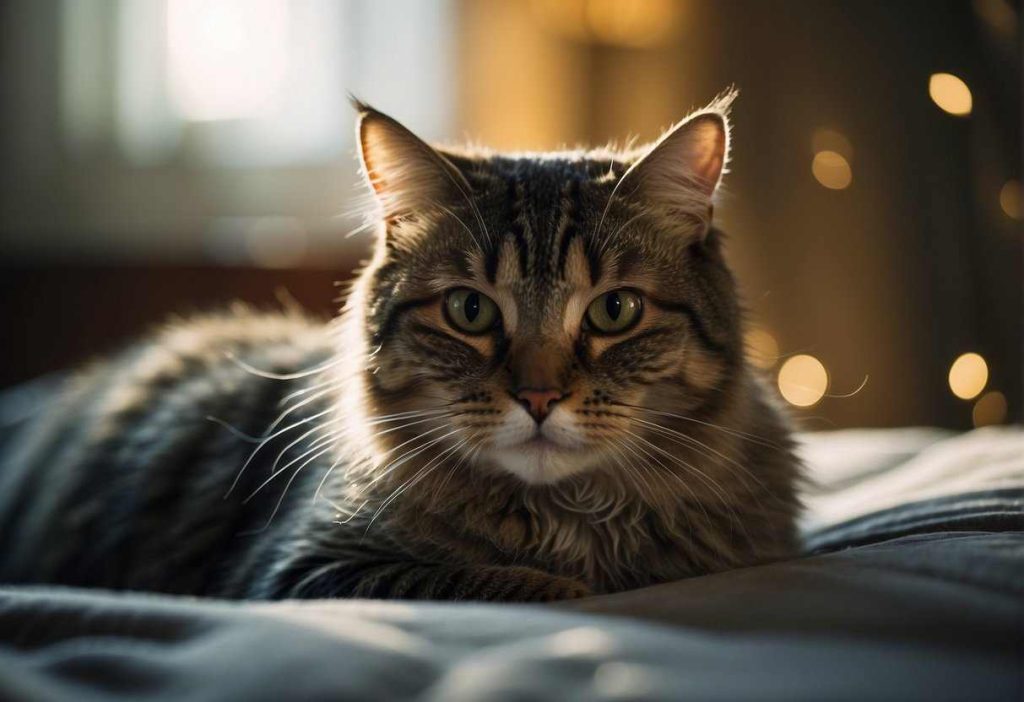
Cats, like their humans, can experience separation anxiety, particularly during the nighttime. Let’s break it down:
- Symptoms: Look out for telltale signs like excessive meowing or scratching at the door.
- Causes: Your absence might just be the trigger. Cats are creatures of habit and changes in routine can upset them.
Managing Anxiety:
- Establish a comforting evening routine and stick to it. Consistency is key!
- Interactive toys can be bedtime buddies for your kitty when solo snoozing.
Emotional Support:
- Don’t skimp on the TLC; affectionate interactions before bed can help reassure them.
Being Proactive:
- Don’t wait for a full-blown cat opera at midnight. If your cat is showing early signs of distress, it’s time to act.
- Incorporate playtime sessions to tire them out before bedtime.
Remember, your cat’s well-being is in your hands. Stay observant and supportive. A little effort goes a long way in ensuring peaceful nights for both you and your whiskered companion.
Frequently Asked Questions
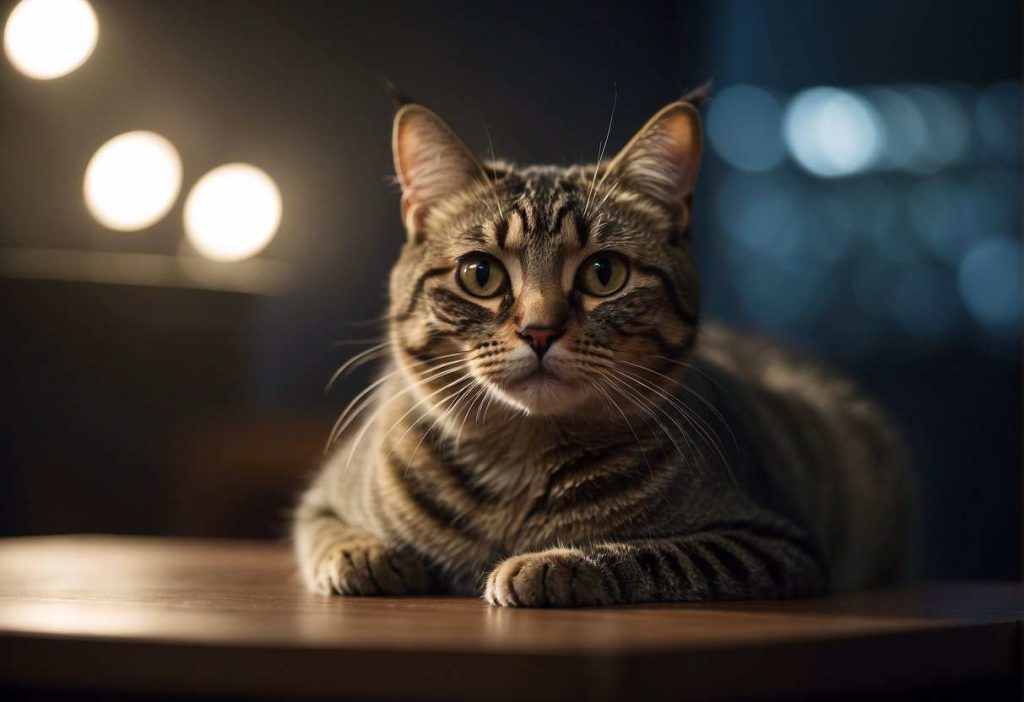
Caring for your feline friend includes understanding their unique needs, especially when it comes to night-time behaviors.
It’s essential to grasp the causes and symptoms of separation anxiety and to know how to address it effectively.
What are the primary causes of cat separation anxiety at night?
Changes in routine or environment can spark anxiety in cats during the night.
This could include your absence if they’re used to you being around, or even your lack of attention during these hours if you’re normally an active night owl.
How can I tell if my cat has separation anxiety at night?
You might notice excessive meowing, pacing, or even destructive behavior as your cat attempts to cope with the anxiety of being apart from you.
Look for signs such as uneasiness or a change in sleep patterns that coincide with your bedtime routine.
What are the first steps to managing my cat’s separation anxiety at night?
Start by creating a cozy sleep environment with familiar items like blankets or toys. Also, establish a consistent routine that signals bedtime is approaching, which can help your cat adjust and feel secure.
Can playing with my cat before bedtime reduce night-time anxiety?
Absolutely! Engaging in play sessions before bed can help tire your cat out, making them more likely to sleep through the night.
This also serves as quality bonding time that can reduce their stress levels.
What role do calming aids play in managing night-time separation anxiety?
Calming aids, such as pheromone diffusers and supplements, can be quite effective in creating a tranquil atmosphere for your cat at night.
They may help to ease your cat’s anxiety and promote a peaceful night’s sleep.
Should I consult a vet for my cat’s night-time separation anxiety?
If your cat’s anxiety is persistent and affects their day-to-day life, it’s wise to consult with a vet.
They can rule out any underlying health issues and guide behavioral or environmental modifications.
Are there any medical treatments for severe cat separation anxiety at night?
In extreme cases, veterinarians might prescribe medication to help manage your cat’s anxiety.
These are typically considered after other remedies have been tried. They are always best used under veterinary supervision.

